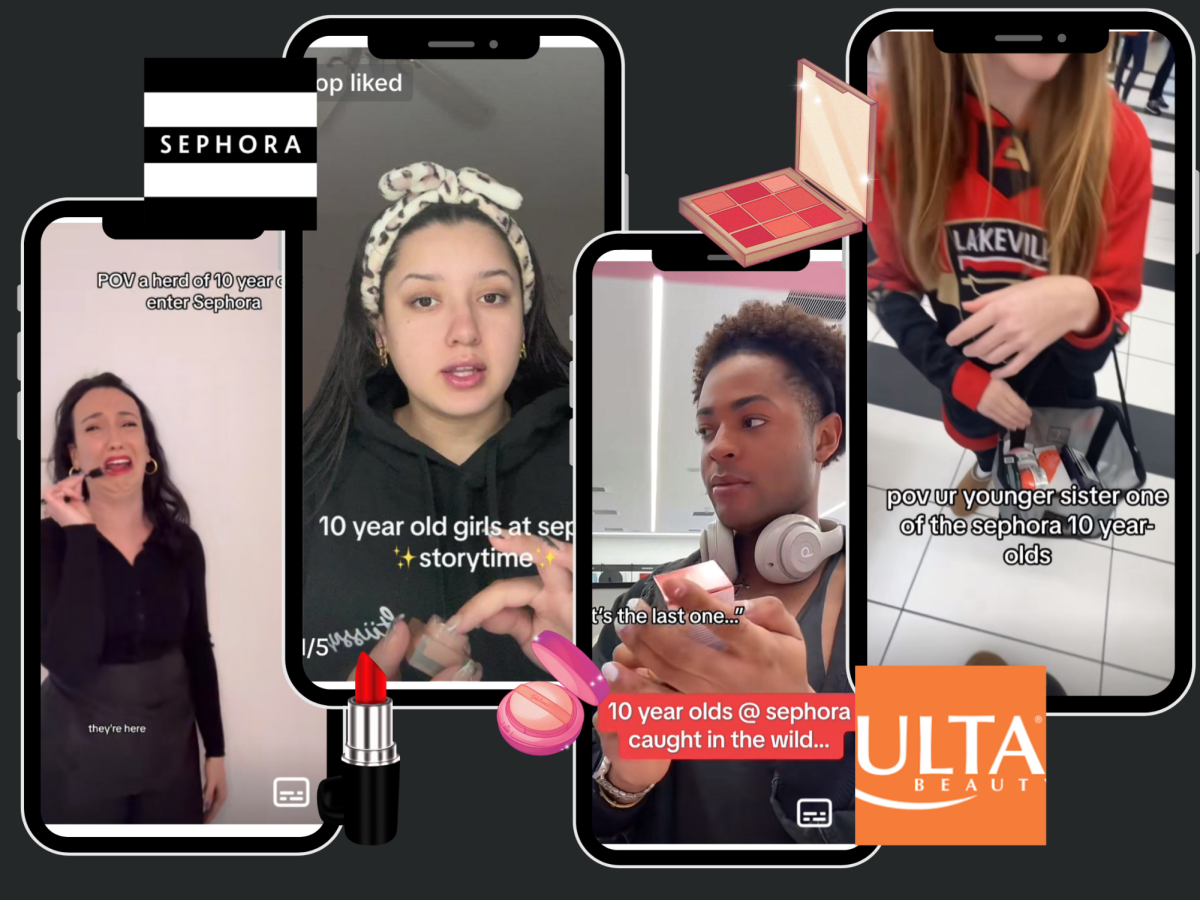Recently, on social media platforms such as TikTok and X, content creators, parents and commentators alike have banded together to criticize their new common enemy: tweenage girls. In prominent establishments such as Ulta and Sephora, makeup connoisseurs have lamented their distaste with elementary-aged children purchasing products by the likes of Drunk Elephant or Summer Fridays. Despite the onslaught of slander deployed on the youth of today’s makeup consumers, the vitriol directed toward tweens interested in cosmetics can come across as callous. From neglecting the role of parents to denying kids the right to grow up on their own terms, the tweens of social media’s favorite makeup deserve an increased amount of empathy.
The naysayers of TikTok do raise a fair point regarding the behavior of cosmetically-inclined tweens; Sephora’s workers and adult shoppers have commented on the disrespectful behavior of young people within the stores. Videos online have detailed the disarray of used free testers left by kids, as well as the torment and overall lack of manners granted to staff members. No adoration for any product warrants verbal abuse toward workers or physical destruction of makeup testers, regardless of the age of the aggressors. Plus, if children do not stick around to clean up their messes, that increases the burden on the employees at makeup stores, overall creating a negative atmosphere for any party involved. While the blame for the destruction caused by Sephora tweens should indeed fall on them, there lies another party partially responsible for the damage caused: the parents.
Discipline begins at home, with parents responsible for teaching their children right from wrong. Selfishness may stand as inherently human, but learned behaviors such as respect, humility and manners should start at home, and receive nurturing from parents. Adults have also pointed out the potential exploitation of children at the hands of their parents online, with adults managing and monitoring their children’s social media accounts. Without productive regulations, kids face exposure to the over-consuming nature of social media, filled with sponsorships and marketing from makeup brands too old for elementary schoolers. Although the disruptive behavior of Sephora tweens should face consequences, so should the parents’ actions that negatively enable their children’s actions.
“They’re [kids] literally ruining their skin at such a young age and they think it’s so cool they have the new Drunk Elephant whatever but they’re really not. But at the end of the day, it’s their lives and their parent’s responsibility to create a limitation on what they do and what they buy and stuff. Social media plays a big role because beauty standards have a big impact on children which I think now is about to create insecurities within these kids which is not so good,” sophomore Olyvia Graham said.
If one searches “10-year-olds in Sephora” on TikTok, hundreds of videos appear depicting the shopping excursions of the makeup industry’s least favorite tweens, or storytimes from store employees. Several rants concerning Sephora and Ulta tweens carry the same pessimistic tone of disappointment or discontent towards kids in their stores, a burden that young people should not bear the brunt of.
The financial actions of Sephora tweens should not face scrutiny by the nameless or faceless audiences on TikTok or Instagram. Unfortunately for elementary-aged consumers, social media users attack their actions, when they may not understand the gravity of their actions. According to an interview on the National Public Radio (NPR) featuring neurologist Frances Jensen, the teenage brain stands at an impressionable period in their lives, still feasibly susceptible to the influence around them. That principle of reckless abandon also applies to the tweenage demographic, an unfortunately forgotten group of adolescents who still experience the tribulations of growing up without the acknowledgment of older age groups.
Another prominent talking point lies with the type of products Sephora tweens have purchased. Products from brands such as The Ordinary or serums and moisturizers containing retinol have captured the attention of young kids, likely due to their prominence on social media feeds or attractive packaging. Even then, influencers may not advertise the side effects of using particular products or the allotted age groups that should utilize certain serums or oils. While accounts do exist that detail the materials used in skincare products, several do not market their videos to children, thus resulting in that demographic missing crucial content. For all audiences to reach the valuable information necessary to protect their skin, they miss the mark in delivering that message to kids.
“Influencers promoting [makeup] obviously have a huge effect, the companies themselves who market towards kids and beauty standards for women but the blame really goes on the parents who enable their kids and buy products for their kids. The kids are not at fault because they are just kids trying to figure out their lives and being told by the powers that be and each other. It’s a cycle, every day they open their social media, which 10-year-olds shouldn’t have. This will end but I feel the next generation will be 100% more entitled just because of these habits they have now,” magnet junior Makenna Muntuga said.
The role of tweenagers in the over-consumption and total destruction of Sephora stores brings forward a broader issue of the role of social media and the extent of its influence on audiences. Due to algorithms curated to the tastes and preferences of the viewer, one liked or saved video can result in an influx of content to convince an audience to purchase tens of hundreds of dollars worth of products. Regulations must exist where young people do not receive the same amount of exposure to advertisements or sponsorships that improperly sway them to purchase products they can not—and should not—afford. Instead of commenters on TikTok passing judgment on the tweens in makeup stores, accountability must fall upon the role of the social networking sites that seek to push them to purchase.










